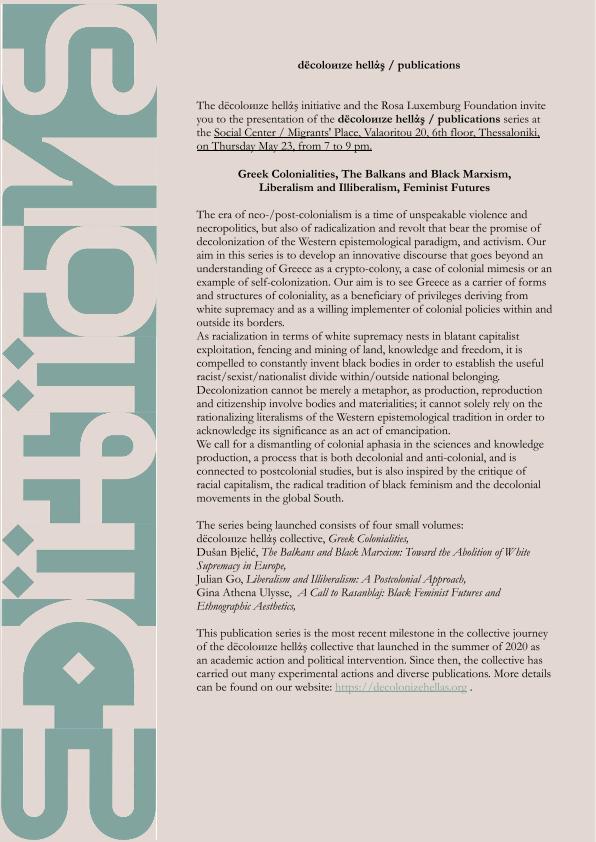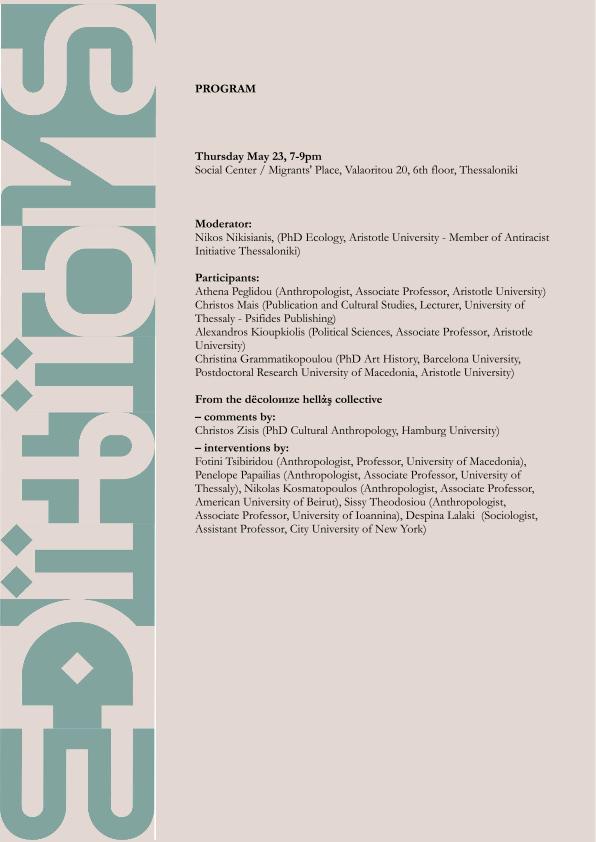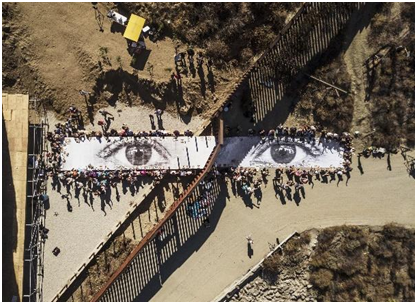Greek Colonialities, The Balkans and Black Marxism,
Liberalism and Illiberalism, Feminist Futures
Thursday, May 23, from 7 to 9 pm
Social Center / Migrants’ Place, Valaoritou 20, 6th floor, Thessaloniki,


Greek Colonialities, The Balkans and Black Marxism,
Liberalism and Illiberalism, Feminist Futures
Thursday, May 23, from 7 to 9 pm
Social Center / Migrants’ Place, Valaoritou 20, 6th floor, Thessaloniki,


ETHNOGRAFEIN
Critical dialogues, epistemological challenges,
field experiences, creative texts
“Borders and boundaries revisited:
Anthropological perspectives and public engagement”

Performance oikade (Aleksandros Plomaritis)
[provided by Dr. Christina Grammatikopoulou]
The online seminars series ETHNOGRAFEIN, since its inception in the spring of 2021, aims to contribute to a critical and interdisciplinary discussion about the theory and practice of ethnography, the epistemology of research, the significance of embodied experience, and also the modes of dissemination of the anthropological knowledge produced to both academic and non-academic audiences. The anthropological endeavour, both as a mode of research practice and a form of political writing, is based on the fundamental epistemological premises of critical evaluation, empathy, reflection, and self-referentiality and highlights the significance of a multifaceted analysis for the understanding of the local to the global.
Organisation and coordination: Fotini Tsibiridou – Ioannis Manos – Eleni Sideri
“Borders and boundaries revisited:
Anthropological perspectives and public engagement”
The 4th period of the ETHNOGRAFEIN online seminars, starting in October 2023 with the title “Borders and boundaries revisited: Anthropological perspectives and public engagement“, sets the study of geopolitical borders as its point of departure to examine the diverse phenomena and processes that abound in the contemporary state border regions and have multilevel consequences for the border populations.
By definition, studying borders and boundaries involves exploring the relationship between the ‘inside’ and the ‘outside’, or the “Self” and the “Other”. However, this is not a study of clear-cut dichotomies but an analysis of the interplay of multiple, multilevel, coexisting, but not necessarily interconnected processes. Boundaries are configured and take shape within a historically determined frame. They are subject to transformations in socio-political and economic contexts and are characterised by institutionally organised asymmetrical power relations. The complex making of borders and boundaries often emerges as a continuous interaction between mobility and enclosure, communication, coexistence, exchange, interaction, sameness and otherness, separation, exclusion, segmentation, connection and disconnection.
The anthropological study of geopolitical borders and their populations by anthropology was systematised in the mid-1990s. It was initially based on two paradigms: the study of the USA-Mexico and European borders. Nowadays, analysing social phenomena and cultural processes concerning borders and boundaries transcends disciplinary boundaries. Novel approaches such as the crοsslocations framework and the current discussion on decolonising methods and epistemologies have expanded the analytical and conceptual significance of the concepts of border and boundary. New methodological and interpretative tools have been created to study politics, trans-border mobility, materiality, transnationalism, topologies and genealogies of migration and refugeeness, border economics, and nation-state policies concerning spatial and cultural diversity, minority rights, and performative culture.
Based on detailed explorations of ethnographic research and anthropological insights, the 4th cycle of the ETHNOGRAFEIN online seminars critically examines the theoretical, epistemological and methodological complexities surrounding the study of geopolitical borders and their imposed dichotomies. Moreover, it discusses anthropology’s potential to bring forth the subtleties of human voices often overshadowed by macro narratives and create an inclusive, comprehensive dialogue in the public sphere that demonstrates the multiplicity of lived experiences.
22 April 2024
“Actions from below and exit from the Cypriot liminality”
Pafsanias Karathanasis
PhD in Social Anthropology from the University of the Aegean
22/4/2024
Pafsanias Karathanasis : Actions from below and exit from the Cypriot liminality
The presentation draws on my ongoing research experience in the divided Cypriot capital, which aspires to add a piece to our understanding of the otherwise complex Cyprus Problem. Focusing on the Cypriot division, and on the boundaries that it creates, it examines the ways in which social subjects attempt to cope with the official restrictions. These can be social, political or geographical, but they are also expressed as restrictions to the development of the imagination for a different future. Following contemporary anthropological approaches to the concept of liminality, the analysis begins from the old town of Nicosia, a liminal urban space – next to the Green Line – and attempts to place the processes taking place there in a broader context of analysis of Cypriot society within the conditions created by the controlled reconnection of the two sides after 2003. Drawing on a spatial analysis of political and cultural activities situated in the geographical and symbolic in-between, it attempts to approach the continuation of Cypriot division as the maintenance of an uncertain and precarious in-between state and proposes an interpretation of these activities as examples of efforts aimed at exiting the prolonged Cypriot liminality; efforts, that is, aimed at ‘life in Cyprus without the Cyprus Problem’, even if its official solution never comes.
Pafsanias Karathanasis holds a PhD in Social Anthropology from the University of the Aegean. His research interests include the anthropology of space and cities, visual culture, and political anthropology. Specifically, he is concerned with urban cultures and contested spaces in cities and border areas. He has conducted research on urban practices such as street art, public art, and activism, and has conducted participant observation with political and artistic groups active in Athens, and in the borderscapes of Mytilene and Nicosia. His articles have been published in academic journals and edited volumes, and he has participated in international conferences in Greece and abroad, and in the organization and scientific curation of panel discussions at conferences and festivals. He has collaborated as a postdoctoral researcher with the University of the Aegean, Panteion University, and the University of Amsterdam, as a lecturer with the University of Macedonia, as a coordinator of academic and educational activities with the Athens Ethnographic Film Festival-Ethnofest and he is a member of the Board of Directors of the Association of Social Anthropologists of Greece-SKAE.
Only those participants who wish to receive certificates of attendance register in the following form: https://forms.gle/GgfLbkfST5jBbkUN7
The registration form will receive answers one week before the seminar, that is from 15/4/2024 to 22/4/2024.
The seminars are held on Mondays from 16:00-18:00
————————————————————————–
Seminar Platform: ZOOM
Link https://zoom.us/j/8364531775?pwd=OVg3YVZlbmVCYWs3S0JYcEFGYlV1QT09
Meeting ID: 836 453 1775 Passcode: KB2JKa